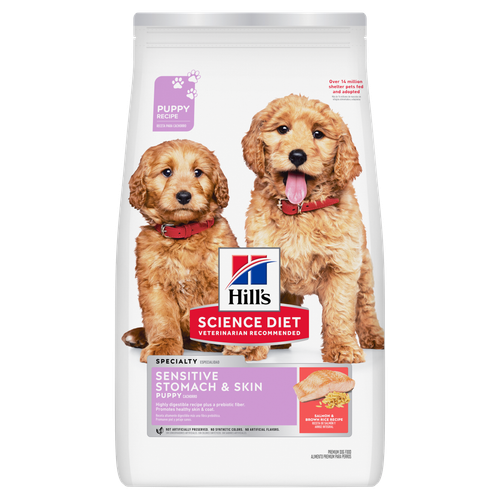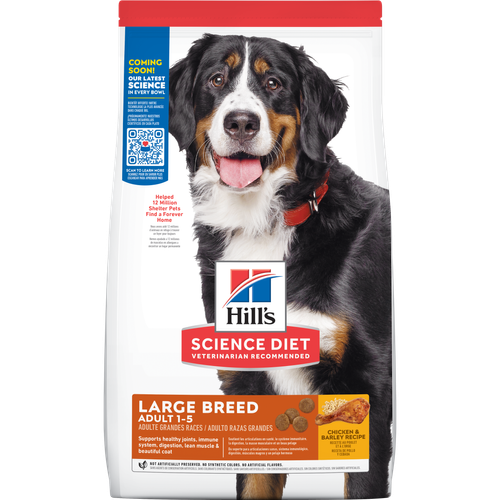
-
Find the right food for your petTake this quiz to see which food may be the best for your furry friend.Find the right food for your petTake this quiz to see which food may be the best for your furry friend.Featured products
 Puppy Sensitive Stomach & Skin Salmon & Brown Rice Recipe
Puppy Sensitive Stomach & Skin Salmon & Brown Rice RecipeDelicious, highly digestible recipe, gentle on stomachs. Nourishes skin & promotes a lustrous coat
Shop Now Puppy Large Breed Chicken & Brown Rice Recipe
Puppy Large Breed Chicken & Brown Rice RecipeVital nutrients to support 5 essential building blocks for lifelong health
Shop Now Adult Chicken & Barley Recipe Dog Food
Adult Chicken & Barley Recipe Dog FoodSupports lean muscle and beautiful coat for adult dogs
Shop NowFeatured products Adult Urinary Hairball Control Chicken & Rice Recipe Cat Food
Adult Urinary Hairball Control Chicken & Rice Recipe Cat FoodActively supports the health of the whole urinary system
Shop Now Kitten Chicken Recipe
Kitten Chicken RecipeVital nutrients to support 5 essential building blocks for lifelong health
Shop Now Adult 7+ Chicken Recipe Cat Food
Adult 7+ Chicken Recipe Cat FoodSupports energy level and beautiful fur in mature cats
Shop Now -
Dog
- Dog Tips & Articles
-
Health Category
- Weight
- Food & Environmental Sensitivities
- Urinary
- Digestive
- Joint
- Kidney
-
Life Stage
- Puppy Nutrition
- Adult Nutrition
- Senior Nutrition
Cat- Cat Tips & Articles
-
Health Category
- Weight
- Skin & Food Sensitivities
- Urinary
- Digestive
- Kidney
-
Life Stage
- Kitten Nutrition
- Adult Nutrition
Featured articles Pet Food Storage Tips
Pet Food Storage TipsDiscover how and where to store your dry, as well as canned, dog and cat food. Learn how to find the "best before" dates on all Hill's pet food packaging.
Read More The Incredible Science Behind Your Pet's Microbiome
The Incredible Science Behind Your Pet's MicrobiomeLearn what a pet's microbiome is, how it contributes to your pet's gut & overall health, and why nutrition is important in maintaining healthy microbiomes.
Read More Water
WaterDiscover why water is the most important nutrient for your dog or cat to live a healthy life. Find out how much water your pet should consume each day.
Read More -


An important part of maintaining a healthy dog is ensuring he or she has a healthy skin and coat. The amount of care your dog needs will vary, but all dogs need a good grooming regimen.
Grooming options to be considered:
- Check with private pet groomers, your veterinarian or even your local pet specialty store.
- Reputable groomers are well trained and familiar with the needs of your particular breed of dog. They’ll also clean your dog’s ears and cut his nails.
- You may choose to groom your dog, or do part of the work yourself with the occasional trip to the groomer. This is a wonderful opportunity to spend time with your dog. Most dogs love the attention they get with a good brushing.
Healthy coat's appearance: A healthy coat will be soft and relatively smooth even on short or wired hair breeds. The coat should be shiny but not greasy, and it should not have a strong odor.
Unhealthy coat's appearance: A dog with an unhealthy coat will have dry and brittle hair with lots of loose hair in the coat. The coat itself may also be greasy or have a dusty appearance and include bald spots and an unpleasant oily smell.
Brushing is the most important part of dog grooming:
- Long-haired breeds — such as Irish setters, border collies, shelties and Pomeranians — need to be brushed twice a week.
- Dogs prone to shedding, or with thick undercoats, should be brushed once a week.
- Even short-haired breeds benefit from regular grooming to remove loose hair.
Brushing requires the appropriate tools. There are as many different types of brushes as there are types of coats on a dog. Ideally, you need two brushes: one with widely spaced teeth for the coat's outer layer and a finer-spaced brush for combing and brushing around the face. You can also ask your veterinarian or groomer for a recommendation.


Tasty Tips
Dogs are content without a bath. "Doggy smell" is mostly caused by a buildup of bacteria and oil on a dog’s coat. Bathing will eliminate this build up.
Be careful with "over-bathing." This can lead to dry skin and irritation. Unless your dog is particularly dirty, don’t bathe more than once a month. Also, don’t use shampoo designed for people. Baby shampoo is safe and won’t irritate the eyes, but the detergents are so mild that they won’t remove heavy grime or grease. Ideally, purchase cleaning products formulated for your dog. Your veterinarian or local pet specialty store sells them.
Nutrition is foremost. One of the most important aspects of maintaining a healthy coat is nutrition. Hair is mostly made of protein. The better your dog’s food, the better your dog’s coat. Foods that are rich in essential fatty acids are particularly good for your dog’s coat. If your dog is showing signs of trouble with his coat or skin, his food may be the reason. Hill's has a complete line of products for maintaining healthy skin and coat. Ask your veterinarian about Hill’s® Science Diet® and Prescription Diet® pet foods.
Also consider reading:


One of our staff authors prepared this article for you
Related products

Supports healthy joints, lean muscle, and beautiful coat for large breed dogs

Vital nutrients to support 5 essential building blocks for lifelong health

Supports lean muscle and beautiful coat for adult dogs

Delicious, highly digestible recipe, gentle on stomachs. Nourishes skin & promotes a lustrous coat
Related articles

Proper nutrition for your pregnant or nursing dog is vital to her and her puppy's health. Learn what you should do provide her with the proper nutrients.

Understand the role that Omega-6 and Omega-3 fatty acids play in your dog's overall health, and how you can ensure they are getting enough.

Learn about Hill's puppy food and the nutritional benefit & high quality ingredients that it contains for your pup.

Large and giant breed puppies have different nutritional needs than other dogs. Learn how to provide the special care they need to grow up big and strong.

Put your dog on a diet without them knowing
Our low calorie formula helps you control your dog's weight. It's packed with high-quality protein for building lean muscles, and made with purposeful ingredients for a flavorful, nutritious meal. Clinically proven antioxidants, Vitamin C+E, help promote a healthy immune system.
Put your dog on a diet without them knowing
Our low calorie formula helps you control your dog's weight. It's packed with high-quality protein for building lean muscles, and made with purposeful ingredients for a flavorful, nutritious meal. Clinically proven antioxidants, Vitamin C+E, help promote a healthy immune system.

